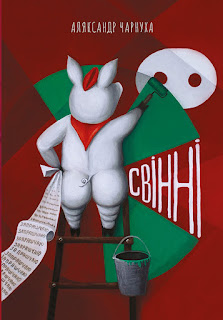Адна з главаў кнігі Аляксандра Чарнухі пачынаецца з апісання помніка Леніну. Нічога асаблівага, такія Леніны жывуць пад сонцам і птушкамі ў кожным населеным пункце Беларусі, але ў нейкі момант аўтар стварае метафару чырвонага правадыра, які сыходзіць з пастамента і пачынае рухацца па вуліцах горада. Гэта быў той момант у кнізе (дарэчы, адзіны), калі ўнутры нешта зварухнулася, і нават сэрца пачало біцца хутчэй - бо стварылася ўражанне, што ў рамане сапраўды адбудзецца нешта вартае ўвагі. Хай бы ўжо Уладзімір Ільіч ажыў ды пайшоў каменнай хадой па вуліцах. Хай бы перастраляў усіх. Хай бы зрабіўся трансгендарам. Хай бы апынуўся марсіянінам. Хай бы наўпрост хадзіў ды картава жадаў кожнаму добрага дня. Але ж не, Ленін застаўся стаяць. Нічога не адбылося. Усяго толькі метафара.

У мяне сапраўды ёсць адчуванне, кволае і не зусім надзейнае, што недзе ў нетрах рамана "Свінні" схавана цалкам сабе добрае апавяданне-фарс пра марнае і бессэнсоўнае жыццё беларускага чыноўніцтва. Калі ўзяць даволі перспектыўную першую главу, інфернальную канцоўку і нешта з сярэдзіны, то можна ўявіць кароткі сатырычны твор, які можа заставіць чытача смяяца скрозь боль і агіду. Але ж ёсць пэўная праблема, калі ўжо на трэцяй главе разумееш, што аўтар нічога табе не скажа на працягу двухсотпяцідзесяці старонак рамана.
Насамрэч, у гэтым месцы я павінен быў бы распавесці пра сюжэт кнігі, пра фабулу і галоўных персанажаў... Зрабіць гэта цяжка, бо падаецца, што раман існуе толькі для таго, каб аўтар уключыў кожны штамп і крынж палітычнага жыцця сучаснай Беларусі (сінія пальцы, жахлівыя дзевяностыя, масандра). Але ж добра. Некалькі словаў пра сюжэт, які сохне і памірае на кожный старонцы "Свіней". Перад намі гарадскі пасёлак Грудзева (дарэчы, геаграфічныя назвы ў кнізе гаворачыя: Качанава, Каранікі...) і яго жыхары. Рэдактар газеты і яе журналісты, галоўны ідэолаг, глава адміністрацыі і г.д. У суседнім пасёлку масава паміраюць свінні, і ўлады пачынаюць думаць пра тое, як падаць гэтую навіну людзям. Сярод іншага, прапаноўваецца растлумачыць трагічные здарэнне нашэсцем іншапланецянаў... Здавалася б - не так усё безнадзейна. Так, але ж аўтар нічога не робіць з гэтай ідэяй. А потым нічога не робіць з ідэяй народнай нездаволенасці. І так да самага канца ў кнізе нічога не адбываецца, адзін нудны рэпартаж за другім (я ведаю, што аўтар працаваў некалі журналістам у Беларусі, але мяне гэта зараз не цікавіць, бо пішу я пра яго раман).
Калі казаць шчыра, я вельмі хацеў, каб яны сапраўды з'явіліся тут, гэтыя іншапланецяне. Бо раман цалкам складаецца з плоскіх персанажаў, зробленых з таннага кардону і размаўляючых на аднолькавай трасянцы.
І тут, канешне, паўстае спрадвечнае пытанне: а што, калі яны насамрэч такія, кардонныя і аднамерныя? Чаму б не паказаць іх такімі, якія яны ёсць? Зразумела, але ў чым тады мастацтва? У чым вартасць кнігі? Па сутнасці, нам прапаноўваецца корпацца ў дзярме, бясконца разглядаць тупасць беларускіх чыноўнікаў і час ад часу казаць "так, памятаю, было і такое". Сатыра? Ну, добра, сатыра, але ці павінна яна быць настолькі прымітыўнай? Ці павінна яна апускацца да ўзроўню тых самых Качанавых ды Каранікаў? Чаму не робіць гэтага, напрыклад, Артур Клінаў у сваім рамане "Локісаў", які робіць сатыру з густам і добрым сюжэтам? Клінаў паказвае, што каб высмеяць і выкрыць правінцыйнае ўбоста, патрэбны кантраст, кантэкст, кантрапункт. Яго галоўны персанаж - гэта цалкам адэкватны чалавек, які трапляе ў свет местачковага вар'яцтва. І раптам ты смяешся і суперажываеш, чытаеш і не можаш спыніцца. Бо апынаешся ў свеце сапраўднай літаратуры.
Альбо возьмем, напрыклад, Андрэя Мрыя. Ва ўступным слове перакладчык кнігі Алесь Плотка (першапачаткова "Свінні" былі напісаны на расейскай мове) распавядае, што гэта першы сапраўды сатырычны беларускі раман з часоў "Запісак Самсона Самасуя". Ну, добра. Але ж нават Самасуй, цалкам камедыйны персанаж, быў вартым суперажывання. Па-другое, у кнізе Мрыя было шмат маленькіх, але сапраўдных сюжэтаў, якія мелі пачатак і заканчэнне. Па-трэцяе, містыка савецкага кантэкста. Так, гумар "Запісак Самсона Самасуя" наўрад ці ўразіць сучаснага чытача - але ж ці прысутнічае гумар у кнізе Аляксандра Чарнухі?
Бо гумар - гэта безумоўна тое, што магло б выратаваць раман "Свінні". Гумар акупляе нават самую дрэнную сатыру. Але ж тут зноў праблема. І калі стабіліе - гэта цікавы наваяз (спалучэнне "стабільнасці" і "ізабілія"), то ў пераважнай большасці выпадкаў гумар тут паўстае у сумным становішчы. Узровень прыкладна такі: важны госць з Менску замаўляе ў мясцовым кафэ воду з лімонам, а яму прыносяць асобна бутэльку вады і парэзаны лімон... Калі мы адыдзем ад гумару (бо вельмі б хацелася адысці ад гумару) і паразмаўляем пра літаратурныя якасці кнігі, то тут сапраўдны жах. Дрэнныя моўныя клішэ (трохпавярховы мат, жоўтая майка лідзера, на ўсю іванаўскую, цыцэронаўскае красамоўства - гэта не словы персанажаў, гэта словы аўтара) і недарэчныя параўнанні (аднекуль з'яўляецца A Hard Day's Night "Бітлз", які выпальвае дзірку ў старонцы рамана; лепш ужо нешта заплесневелае накшталт "яна глядзела як Ленін на буржуазію"). Метафара пра беларускую правінцыю, схаваную за сайдынгам, гэта, бадай, лепшае, што ёсць у "Свіннях", і метафару гэту мы бачым у першай главе кнігі.
Тонкасці тут няма. Няма таксама зместу і густу. Замест гэтага ёсць трасянка, якая мхом пакрывае кожную старонку кнігі. Мільён аднолькавых дыялогаў на трасянцы, якія цяжка чытаць і якія хаваюць крохкія, пункцірныя лініі сюжэту (нехта памірае? нехта працягвае жыць?). Так, што ў пэўны момант пачынаеш думаць, што ёсць тут не толькі трасянка мовы, але і трасянка думкі. Я пагаджуся, што раман "Свінні" дэманструе бяздарнае жыццё беларускіх чыноўнікаў - але ж ці гэта апраўдвае бяздарную кнігу?
